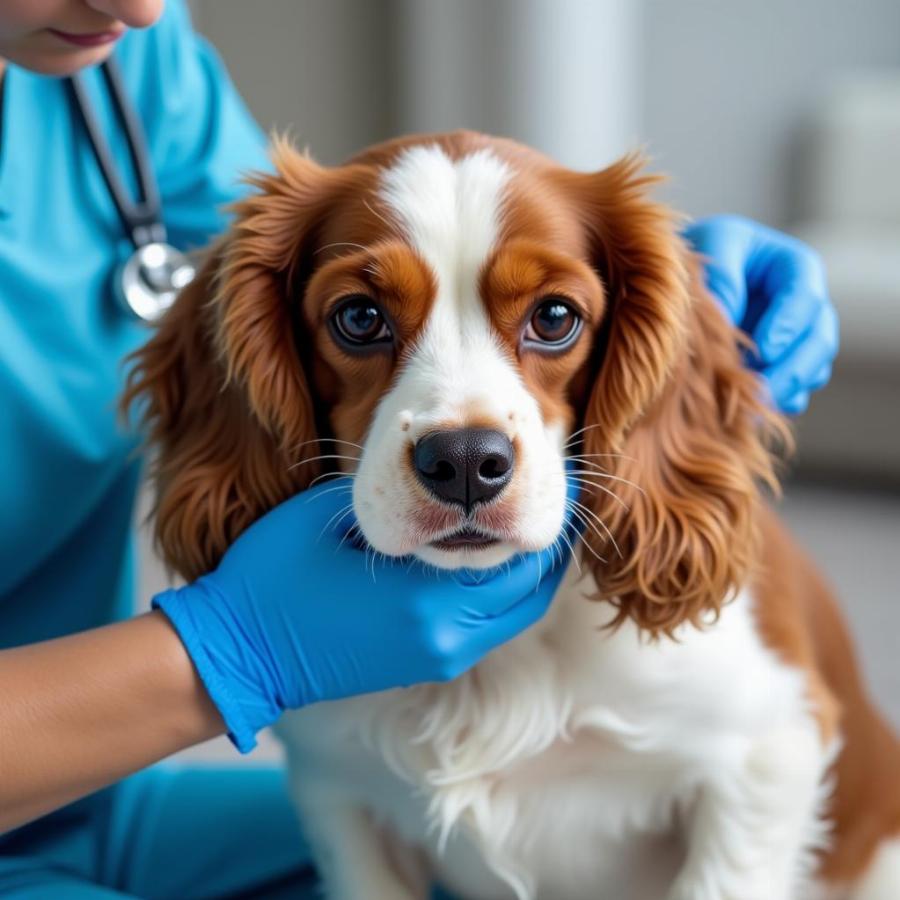Let’s face it, our canine companions can be a bit stinky sometimes. And while we love them unconditionally, that pungent smell emanating from their behinds can be a real nose-wrinkler. But why do dogs anal glands smell so bad in the first place?
A dog’s anal glands are small sacs located on either side of the rectum. These sacs produce a foul-smelling, fishy liquid that acts as a unique scent marker for each dog. Think of it as their own personal signature scent.
What Are Anal Glands For?
In the wild, dogs use their anal gland secretions to mark their territory and communicate with other canines. When dogs poop, the muscles around the anal glands naturally express a small amount of this smelly fluid. This scent tells other dogs information about the “depositor” such as their health, diet, and even their gender.
Why Are My Dog’s Anal Glands So Smelly?
While anal gland secretions are naturally pungent, there are times when the odor becomes particularly offensive. This can be due to a variety of factors, including:
Impacted Anal Glands
Sometimes, a dog’s anal glands don’t empty properly, leading to a buildup of secretions. When this happens, the glands can become impacted, inflamed, and very uncomfortable for your furry friend.
Anal Gland Infection
If impacted glands are left untreated, they can become infected. This can lead to pain, swelling, and even abscesses.
Diet
What your dog eats can also play a role in the odor of their anal glands. Low-quality dog food or a diet lacking in fiber can contribute to softer stools, which may not provide enough pressure to empty the glands properly.
Allergies
Just like humans, dogs can suffer from allergies, and these allergies can manifest in a variety of ways, including anal gland problems.
Signs Your Dog Has Anal Gland Problems
It’s essential to be aware of the signs of anal gland problems so you can seek veterinary care for your dog promptly. Some common signs include:
-
Scooting: If you see your dog dragging their bottom across the carpet, it’s often a telltale sign of anal gland discomfort. They’re trying to relieve the pressure.
-
Excessive Licking: Dogs with anal gland issues may excessively lick or bite at their rear end in an attempt to soothe the irritation.
-
Foul Odor: A particularly strong, fishy, or unpleasant smell coming from your dog’s rear is a clear indication that their anal glands may need attention.
What Should I Do If My Dog’s Anal Glands Smell?
If you notice any of the signs mentioned above, it’s crucial to take your dog to the veterinarian. While it might be tempting to try and solve the problem yourself, it’s best to leave anal gland expression to the professionals.
“Attempting to express your dog’s anal glands at home without proper knowledge and technique can cause more harm than good,” says Dr. Emily Parker, a veterinarian specializing in canine health. “It’s always best to consult with your vet for a proper diagnosis and treatment plan.”
Preventing Anal Gland Problems
While not all anal gland issues are preventable, there are some things you can do to help reduce the likelihood of your dog experiencing problems:
-
Feed a High-Quality Diet: Choose a high-quality dog food that is rich in fiber. This can help promote healthy digestion and firmer stools, which can aid in natural anal gland expression.
-
Maintain a Healthy Weight: Overweight dogs are more prone to anal gland problems. Ensure your dog gets plenty of exercise and maintains a healthy weight.
-
Regular Veterinary Checkups: Schedule regular checkups with your veterinarian, and if your dog is prone to anal gland problems, ask your vet about the frequency of manual expression.
 Veterinarian Examining a Dog's Anal Glands
Veterinarian Examining a Dog's Anal Glands
Conclusion
While the pungent aroma of a dog’s anal glands might not be the most pleasant experience, understanding the purpose and potential problems associated with these glands is essential for every dog owner. By being aware of the signs of anal gland issues and seeking prompt veterinary care when needed, you can help keep your furry friend happy, healthy, and smelling their best (or at least a little less smelly!).
FAQs about Anal Glands in Dogs
Q: Can I express my dog’s anal glands myself?
A: It’s not recommended to express your dog’s anal glands at home without proper training. Improper technique can cause pain and injury.
Q: How often do dogs need their anal glands expressed?
A: Some dogs may never need their anal glands expressed, while others may require it regularly. Consult with your vet for personalized advice.
Q: Is there a way to prevent my dog’s anal glands from smelling?
A: While you can’t eliminate the smell entirely, maintaining a healthy diet, weight, and regular vet checkups can help minimize odor and prevent issues.
Q: Can anal gland problems be a sign of a more serious health issue?
A: While often a minor issue, persistent anal gland problems can sometimes indicate underlying health concerns. It’s always best to consult with your veterinarian for a proper diagnosis.
Looking for More Information?
- Read more about dog licking butt and what it could mean.
- Learn about the possible reasons why do dogs rub their bottoms on the carpet.
- Find out what age do dogs need glands expressed for the first time.
- Discover the dog gland removal pros and cons to make an informed decision.
Beaut Dogs is your trusted source for all things related to dog health and well-being. We provide expert advice and resources to help you give your canine companion the best possible care. For any further assistance or personalized advice, feel free to reach out to our team at [email protected]. We’re here to help you navigate the wonderful world of dog ownership.